US Official Says Iran Used Money Released Under Sanctions Waiver

A US official revealed on Wednesday that Iran has used some of the money held in Oman, which the Biden administration unblocked in November under a sanction’s waiver.

A US official revealed on Wednesday that Iran has used some of the money held in Oman, which the Biden administration unblocked in November under a sanction’s waiver.
Speaking during a hearing before the House Financial Services Subcommittee on Oversight and Investigations, Elizabeth Rosenberg, an assistant at the US Department of Treasury acknowledged that the Iranian regime has made “two transactions” using the $10 billion of the revenues the Islamic Republic received from selling electricity to Iraq.
In a controversial move last month, the Biden administration granted Iraq a new 4-month waiver, enabling the release of an estimated $10 billion to Iran, formerly blocked by US sanctions.
Washington says a thorough vetting process is in place to ensure that any money released is used exclusively for Iran’s humanitarian and "non-sanctionable" needs such as food and medicine.
But critics say money is fungible and the use of this fund, however thoroughly vetted, would free up other foreign currencies for the Iranian regime that can be used for malign activities.
Also during the House hearing, Abraham Paley, the US State Department’s deputy special envoy for Iran, said that the Islamic Republic will not be able to use the $6 billion dollar of its money in Qatar which was released in September as part of a prisoner swap deal with Washington.
“Not a penny of this money has been spent and these funds will not go anywhere anytime soon,” he stressed.
Back in October and following Hamas’ deadly onslaught on Israel, there were reports that US and Qatar reached a deal to refreeze Iran’s money.

Iran has quadrupled its oil revenue since President Joe Biden took office, helping the regime better fund its malign activities, a Congressional hearing was told on Tuesday.
China buys almost three-quarters of the Iranian crude oil shipments, according to experts’ testimony at the hearing, making the most of the Biden administration’s reluctance to antagonize Tehran.
“The Biden administration has taken a consistently weak approach to enforcing the energy sanctions that would have the strongest economical impact on Russia, Iran and Venezuela,” said Rep. Blaine Lutkemeyer, chairing the hearing.
“Iran has been emboldened to throw its weight around the Middle East from Yemen to Gaza, with it or its proxies directly attacking US military sites and warships essentially without consequences,” he added.
The hearing was entitled Restricting Rogue-State Revenue: Strengthening Energy Sanctions on Russia, Iran, and Venezuela. It was hosted by the US House Financial Services Subcommittee on National Security, Illicit Finance, and International Financial Institutions.
Recent data show that “due to diminished sanctions enforcement, Iran has accumulated north of $80 billion dollars in oil revenues since 2021,” said Claire Jungman, chief of staff of United Against Nuclear Iran (UANI).
Investigations by United Against a Nuclear Iran (UANI), an advocacy group in Washington, suggest that Iran has between 300 and 400 “foreign owned and foreign flagged oil tankers shifting its oil.” These are called the “ghost fleet,” vessels that operate under the radar and are not sanctioned by the US.
Almost half these vessels are flagged by Panama – in the US backyard.
Last week, 15 Members of Congress called on the US Secretary of State Antony Blinken to crack down on a “ghost armada” of ships that evade sanctions and find ways to hold Panama accountable for their complicity in Iranian funded terrorism.
Biden critics say his Iran policy has had disastrous consequences for the region and beyond. They argue that Hamas –funded primarily by Iran– could not have pulled off the horrors of 7 October without support from a regime flush with new cash.
Since October 17, militant groups backed or affiliated with the Islamic Republic have attacked American troops 92 times with little or no retaliatory operations by the US.
“The Iranian regime is largely unconstrained and unfettered from a resource standpoint, said Marshall Billingslea, former assistant secretary of the Treasury for terrorist financing. “They’ve gone right back to where they were after the JCPOA was enacted by the Obama administration.”
The JCPOA (or the Iran nuclear deal) was signed in 2015. President Trump ripped it off shortly after taking office and introduced the Maximum Pressure campaign to squeeze the Islamic Republic. After Trump, that campaign was abandoned for a more lenient policy that was hoped to set the scene for a return to some form of a nuclear agreement.
Rep. Dan Meuser said this thinking was flawed. “Our foreign policy prioritizes appeasement over strength. Appeasing hostile regimes does not bring peace, but undermines it.”
Last September, the Biden administration released $6 billion in frozen Iranian oil money to help facilitate the return of five Iranian-Americans held hostage in Tehran. The decision was opposed vehemently by Republicans who said the money would be used for malign activities, regardless of any restricting stipulations in the deal.
Democratic Congresswoman Joyce Beaty countered this in the hearing.
“Under the Biden administration, the US maintained the most extensive set of comprehensive sanctions against Iran, including those related to the illicit sales of Iranian oil,” Rep. Beaty said. “Contrary to accusations leveled by the Republicans, Secretary [of the Treasury] Yellin recently set the record straight that we have not in any way relaxed our sanctions on Iranian oil.”
However, the issue, as set forth by experts at the hearing, is primarily “enforcement” of the sanctions when it comes to Iran.
“The real problem for Iran is not that they’re getting $6 billion into the system,” said Adam Smith of Partner, Gibson, Dunn & Crutcher, “it’s their ability to use that $6 billion to buy things, to send to Hamas, to send to Houthis, etc.”
Chairman Lutkemeyer agreed. “The United States and its allies should return to an approach of strongly reinforcing energy sanctions against these rogue regimes to weaken our enemies,” he said.
Another lawmaker, Rep. Zach Nunn, who has introduced a bill to enhance sanctions enforcement, highlighted the need for new technologies to improve surveillance and tracking (of ghost fleets, for instance) as a necessary step to keep up with increasingly sophisticated methods used by Iran to circumvent sanctions and sell oil.
Such practical considerations, however, are secondary. The real issue is not so much the capabilities than is willingness to change course. And that’s what many critics of the Biden administration say is missing.
“Autocratic regimes have for years tried to advance the narrative that sanctions don’t work,” said Billingslea, “And now some in Washington DC are beginning to parrot their talking points… Sanctions do work when applied properly and enforced.”
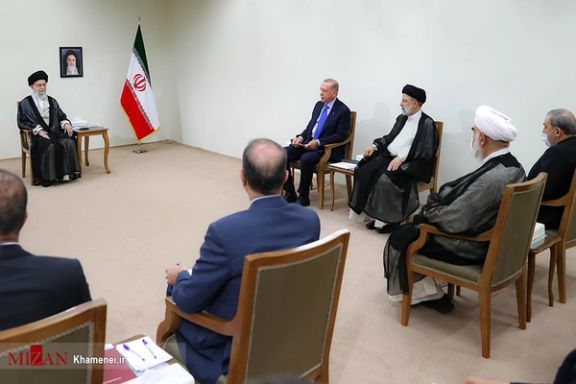
The Islamic Republic in Iran and the Erdogan regime in Turkey act with remarkable similarity in using religion to gain loyal followers in the West.
What the Shiite regime in Iran did over four decades to make religious institutions state-owned entities with success, Atatürk did in a secular regime and made all religious institutions officially state-owned by establishing the Department of Religion (1924).
The Grand Mufti of Turkey is appointed by the executive branch. Diyanet organization has more than 150 thousand employees and about two billion dollars of government budget. The imams of around 85,000 mosques in Turkey and 2,000 mosques abroad (under the supervision of this department) are recruited by this organization and the contents of their speeches are also sent weekly, which is done in Iran by the Friday Prayer Office in Tehran.
Until the 1970s, the Diyanet organization operated within Turkey, but after that, it expanded its network to countries with Turkish immigrants. Since the 1990s and with the rise of the Islamists, this organization has expanded its facilities and staff and received tremendous funding by quadrupling its budget in one decade. It has become a tool for expanding Turkey's ideological, political, and even security sphere of influence in the Balkan Peninsula, Central Asia, Western Europe, and the United States. Thus, civil and independent religion neither exists in Iran under the Islamist regime nor in Turkey under the Erdogan regime.
When the government claims to promote religion as a tool to shape social and political life, and religion is a means of gaining and maintaining power, it harms both religion and the state. It is for this reason that the behavior of the Khamenei and Erdogan regimes in using religious institutions to consolidate their power and expand their influence are very similar, while they operate in two different political systems.
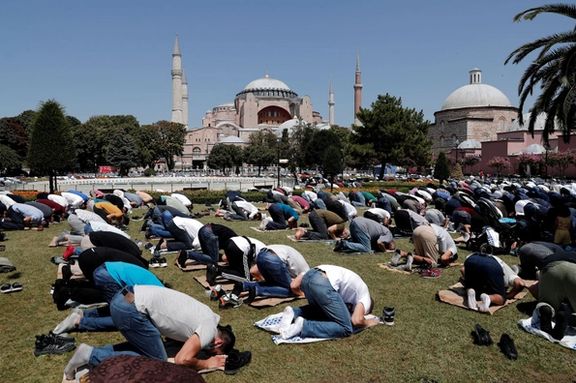
When religious institutions become state-owned, religion becomes a tool of power and it doesn't matter if you have an Islamist or a secular political system. This is why the Diyanet organization acts in the same way as the Mustafa University and the Shiite regime's Islamic Culture and Communication Organization in terms of political-religious propaganda abroad. Erdogan and Khamenei are acting in the same way in financing and expanding religious institutions worldwide. They have formed a network of mosques and religious centers that serve as venues for the gathering of religious followers who are residents of other countries. Using their religious networks these governments promote their political and ideological agendas.
It is important to pay attention to the organizational structure, funding, and programs of these centers. Turkey's state mosques are managed in the US by an organization called "Dyianet Center of America" with its headquarters in Maryland and its 29 mosques scattered all over the United States. The Dyianet Center of America website mentions these mosques under the title of its branches. As of 2018, Diyanet was operating in 36 countries with 61 branches.
All the Turks who attend the mosques linked to Diyanet Center of America did not immigrate to America from Turkey, but some of them immigrated to the United States from countries such as Georgia, Russia, Ukraine, Kazakhstan, and Azerbaijan. What brings these people together is their religious orientation and cultural background. Using the tendency of these Turkish-speaking peoples to worship and congregate, the Turkish government subjects them to political propaganda and buys their loyalty.
The budget for the construction, maintenance, and programs of thousands of mosques affiliated with the Diyanet Center of America and European countries is provided by the Turkish government; missionaries and managers of these centers are sent by the government and receive government salaries, and all programs are approved, funded, and implemented by the Turkish government. Any program that does not fit into the government’s political Islam agenda and the expansion of its influence in the world (especially in Western countries where there is freedom of religion) is not tolerated and immediately canceled in these centers and mosques.
The Diyanet- and the government which manages it- see Islam as one of the features of the identity of Turkish citizens living abroad. The macro-political strategy of Erdogan and Khamenei regimes is to rebuild Ottoman and Iranian empires with a cover of Islamism based on a mixture of religious beliefs and national-historical pride. Therefore, Diyanet is “committed to protecting the Muslims’ religious and cultural roots in the face of assimilationist policies.” Based on this statement, Turkish diaspora’s integration into host societies is something that should never happen.
Due to the author’s observations in mosques under the administration of Diyanet in the New York/New Jersey area, the authority and legitimacy of the political regime of Turkish Islamists are promoted in three ways:
1. The presence of political officials of the regime in religious ceremonies and giving prizes to children and financing religious centers and mosques with public resources;
2. Using these mosques and centers for political mobilization in favor of the government in areas such as voting for the ruling party candidates in elections; and
3. Recruiting forces for networking, gathering information from the opposition, and distributing positions, rents, and facilities available to the government.
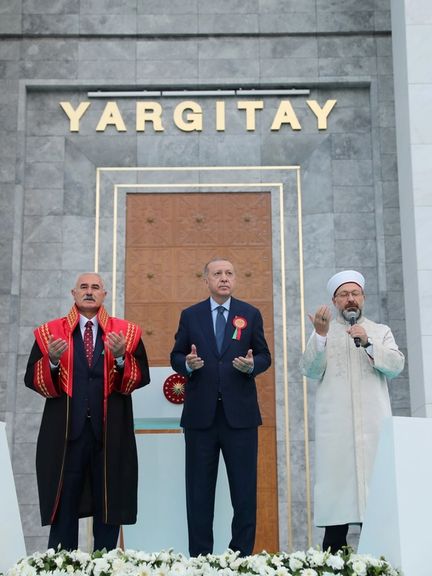
The activities of the Turkish Directorate of Religious Affairs (Diyanet Isleri Baskanligi) are based on multi-purpose missions. The main mission is to promote Sunni Islam, but without other missions, this department would not have expanded to this extent it has and would not have received huge funding.
The main content of religious centers and mosques is holding religious ceremonies (such as Friday and congregational prayers, Eid al-Adha and Fitr, and the celebration of the birth of the Prophet), delivering various religious services such as Hajj and Umrah as well as various religious educational activities for Turkish migrants, children's religious education (recitation of the Qur'an, the principles of religion) and the establishment of religious classes and schools (for the teaching of jurisprudence and theology). What is really presented in this content is a kind of political perception of Islam and injecting it into the minds of Muslim children to internalize the ideology of political Islam. It is used as a tool for Turkey’s propaganda and indoctrination. The main discourse of the content of these programs is not human rights articles based on the equality of rights of all people, including men and women, Kurds and Turks, Muslims and non-Muslims, homosexuals, and non-homosexuals.
There have been accusations of Diyanet personnel gathering intelligence and spying on behalf of the Turkish state. In January 2017, the Turkish-Islamic Union for Religious Affairs (DİTİB) admitted that some of its imams in Europe had spied for the Turkish government and supplied Ankara with intelligence on people supposedly linked to the Gülen movement, a religious group the Turkish government accuses of masterminding a coup attempt in July 2016.
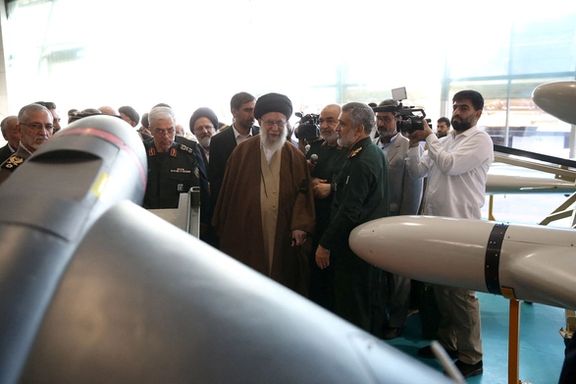
The EU has brought sanctions against Iranians involved in the manufacture of unmanned aerial vehicles (UAVs) used by Russia in Ukraine.
The European Council – the EU’s governing body - has implemented the new set of stringent measures against six individuals and five outfits engaged in Iran's development and production of the drone.
This represents the first application of measures within a newly established framework aimed at restricting Iran's military support for Russia's unjust war of aggression against Ukraine. The measures align with earlier sanctions against Iranian drone-related activities.
The new measures target Iranian company Shakad Sanat Asmari, its CEO, deputy CEO, and chief scientist. Also engaged in the production of UAV components are Baharestan Kish Company and its managing director, Saad Sazeh Faraz Sharif and its CEO, while Sarmad Electronic Sepahan Company provides aerospace engineering services. Kimia Part Sivan Company assists Iran's Islamic Revolutionary Guard Corps Quds Force (IRGC-QF) in advancing the UAV program. All have now been subjected to the measures.
The sanctions encompass asset freezes and travel bans within the European Union. Any supply of funds or economic resources, whether directly or indirectly benefiting those listed, is strictly forbidden.
The Council has strongly criticized and declared as unacceptable any type of military assistance from Iran, encompassing the transfer of UAVs to Russia's war of aggression against Ukraine. The arms provided by Iran have been employed indiscriminately by Russia, leading to extensive destruction and human suffering among Ukraine's civilian population and infrastructure.
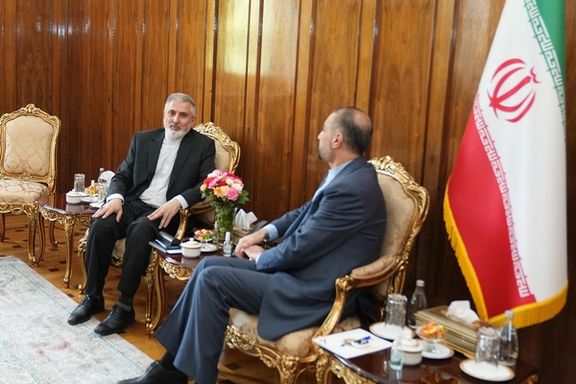
The Australian government has condemned Iran’s ambassador after he called for “an end” to Israel as the world’s “most notorious killing machine”.
Ahmad Sadeghi, who assumed the role in July, made the remarks in tweets commenting on the conflict with Hamas in Gaza.
He said: “Israeli war criminals are back to their inherent job of fear and terror. No alternative for humanity but to put an end to the heinous life of the most notorious killing machine in current world history. Hope for a world short of apartheid regime.”
In earlier remarks he equated Zionism with apartheid, saying: “It's been a faucet for occupation, ethnic cleansing & a real holocaust against [Palestinian] civilians now.”
Jewish leaders expressed shock at what they described as a brazen disregard for Australia's multicultural community, wrote the Daily Mail.
Liberal Senator Claire Chandler branded Sadeghi's statements "absolutely unacceptable" and pointed to the regime's alleged genocidal intentions towards Israel and support for terrorist groups like Hamas.
Foreign Affairs Minister Penny Wong's spokesperson said: "We condemn the Ambassador’s comments. There is no place for antisemitism in Australia. The Australian Government expects all diplomats to be respectful and constructive."
Sadeghi's official X account, which is conventionally used for diplomatic updates and photos, has featured multiple images of dead children and inflammatory invective against Israel since the conflict began in October.
He has also used it to share details of an event he attended alongside Australian National University students, where Israel was reportedly condemned as an "apartheid regime."
Pressure has mounted on the Australian government to take a tougher stance on Iran, citing reported intimidation tactics and claims of funding Hamas amid escalating tensions with Western nations.
The Iranian Embassy defended Sadeghi's remarks, asserting they align with Iran's policy for Palestinians to determine their destiny through democratic means.
The Australian National University (ANU) said that the event Sadeghi attended nwas student-led, and the university does not condone discriminatory speech.

The daughter of a German-Iranian US citizen who has been sentenced to death in Iran has called on Washington and Berlin to “take action” and save her father.
Jamshid Sharmahd, a 68-year-old software developer and California resident, was allegedly abducted during a visit to the United Arab Emirates in 2020 and forcibly taken to Iran.
In April, the Iranian judiciary sentenced him to death on charges of "spreading corruption on Earth," a verdict upheld by Iran's Supreme Court.
His family vehemently denies the allegations, and Amnesty International has condemned the trial as a sham.
At the end of last week, German officials disclosed that Foreign Minister Annalena Baerbock had held discussions about Germans detained in Iran with her Tehran counterpart, Hossein Amir-Abdollahian.
On Sunday, Jamshid’s daughter Gazelle Sharmahd responded, tweeting: “I have requested an input from the German Government regarding what was discussed about the hostages in Iran, in particular about my father Jamshid Sharmahd.”
In remarks targeted at US President Joe Biden, she said: “What are you doing for the US hostages after you handed the Islamic regime $6 billion, and still couldn’t save all US nationals like my dad. We are still waiting for you to take action. Action that won’t further threaten my dad‘s life and won’t further empower his kidnappers.”
She earlier expressed frustration with the passing of responsibility between Germany and the US, stating, "The issue is tossed back and forth, with each side claiming 'not my citizen,' 'not my jurisdiction.' And we're not getting through to them."